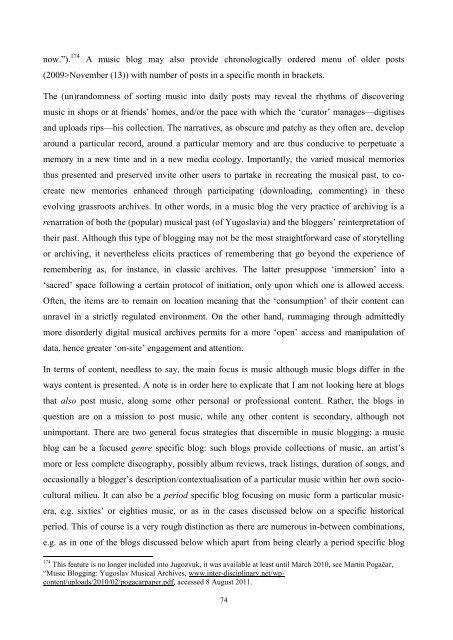UNIVERSITY OF NOVA GORICA GRADUATE SCHOOL ...
UNIVERSITY OF NOVA GORICA GRADUATE SCHOOL ...
UNIVERSITY OF NOVA GORICA GRADUATE SCHOOL ...
Create successful ePaper yourself
Turn your PDF publications into a flip-book with our unique Google optimized e-Paper software.
now.‖). 174<br />
A music blog may also provide chronologically ordered menu of older posts<br />
(2009>November (13)) with number of posts in a specific month in brackets.<br />
The (un)randomness of sorting music into daily posts may reveal the rhythms of discovering<br />
music in shops or at friends‘ homes, and/or the pace with which the ‗curator‘ manages—digitises<br />
and uploads rips—his collection. The narratives, as obscure and patchy as they often are, develop<br />
around a particular record, around a particular memory and are thus conducive to perpetuate a<br />
memory in a new time and in a new media ecology. Importantly, the varied musical memories<br />
thus presented and preserved invite other users to partake in recreating the musical past, to cocreate<br />
new memories enhanced through participating (downloading, commenting) in these<br />
evolving grassroots archives. In other words, in a music blog the very practice of archiving is a<br />
renarration of both the (popular) musical past (of Yugoslavia) and the bloggers‘ reinterpretation of<br />
their past. Although this type of blogging may not be the most straightforward case of storytelling<br />
or archiving, it nevertheless elicits practices of remembering that go beyond the experience of<br />
remembering as, for instance, in classic archives. The latter presuppose ‗immersion‘ into a<br />
‗sacred‘ space following a certain protocol of initiation, only upon which one is allowed access.<br />
Often, the items are to remain on location meaning that the ‗consumption‘ of their content can<br />
unravel in a strictly regulated environment. On the other hand, rummaging through admittedly<br />
more disorderly digital musical archives permits for a more ‗open‘ access and manipulation of<br />
data, hence greater ‗on-site‘ engagement and attention.<br />
In terms of content, needless to say, the main focus is music although music blogs differ in the<br />
ways content is presented. A note is in order here to explicate that I am not looking here at blogs<br />
that also post music, along some other personal or professional content. Rather, the blogs in<br />
question are on a mission to post music, while any other content is secondary, although not<br />
unimportant. There are two general focus strategies that discernible in music blogging: a music<br />
blog can be a focused genre specific blog: such blogs provide collections of music, an artist‘s<br />
more or less complete discography, possibly album reviews, track listings, duration of songs, and<br />
occasionally a blogger‘s description/contextualisation of a particular music within her own sociocultural<br />
milieu. It can also be a period specific blog focusing on music form a particular musicera,<br />
e.g. sixties‘ or eighties music, or as in the cases discussed below on a specific historical<br />
period. This of course is a very rough distinction as there are numerous in-between combinations,<br />
e.g. as in one of the blogs discussed below which apart from being clearly a period specific blog<br />
174 This feature is no longer included into Jugozvuk, it was available at least until March 2010, see Martin Pogaĉar,<br />
―Music Blogging: Yugoslav Musical Archives, www.inter-disciplinary.net/wpcontent/uploads/2010/02/pogacarpaper.pdf,<br />
accessed 8 August 2011.<br />
74

















